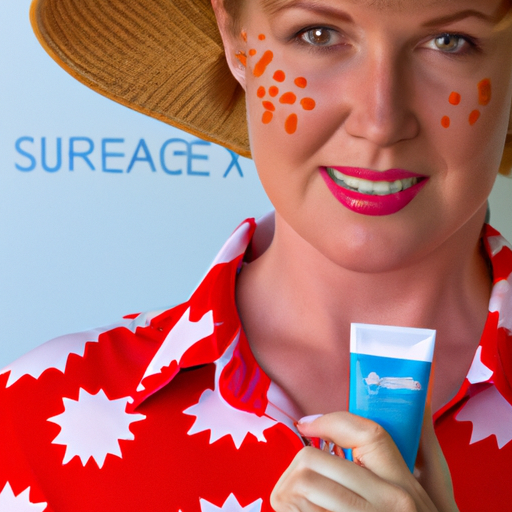Protecting your skin from the harmful rays of the sun is essential, and this holds true for women in particular. Sunscreen plays a vital role in shielding your skin from excessive sun exposure, preventing sunburn, premature aging, and even reducing the risk of skin cancer. By wearing sunscreen daily, you can maintain a healthy and youthful complexion, ensuring that your skin remains radiant and glowing for years to come. So, let’s explore the significance of sunscreen for women and how it can help safeguard your skin from the sun’s harmful effects.
Table of Contents
ToggleProtection against skin damage from the sun
UV radiation and its effects on the skin
UV radiation from the sun can have harmful effects on the skin. When the skin is exposed to the sun’s UV rays, it can lead to various skin issues, including sunburn, hyperpigmentation, premature aging, and an increased risk of skin cancer.
Sunburn and its consequences
Sunburn is a common result of prolonged exposure to the sun’s UV rays. It can cause redness, pain, peeling, and in severe cases, blisters. Sunburn not only damages the outermost layers of the skin but also increases the risk of skin cancer later in life.
Hyperpigmentation and sunspots
Hyperpigmentation refers to the darkening of certain areas of the skin due to increased melanin production. Sun exposure can lead to the development of sunspots, also known as age spots or liver spots. These are flat, brownish spots that typically appear on sun-exposed areas of the skin, such as the face, hands, and shoulders.
Premature aging and wrinkles
Excessive sun exposure can accelerate the aging process, resulting in the development of wrinkles, fine lines, and sagging skin. The sun’s UV rays break down collagen and elastin in the skin, which are responsible for maintaining its firmness and elasticity. This can lead to premature aging and a dull, aged appearance.
Reducing the risk of skin cancer
One of the most significant risks of unprotected sun exposure is the development of skin cancer. Skin cancer is the most common type of cancer globally, and it often occurs on sun-exposed areas of the body. Regularly using sunscreen and practicing sun protection measures can significantly reduce the risk of skin cancer.
Preservation of skin health
Maintenance of skin’s natural moisture
Sun exposure can cause dehydration and dryness in the skin. UV rays can disrupt the skin’s protective barrier, leading to moisture loss. Using sunscreen helps maintain the skin’s natural moisture balance and prevents dryness.
Preventing dryness and dehydration
Dry, dehydrated skin can be uncomfortable and contribute to the development of other skin issues. Using sunscreen regularly helps prevent moisture loss, allowing the skin to stay hydrated and healthy.
Protection against environmental factors
The skin is constantly exposed to various environmental factors, including pollution, harsh weather conditions, and free radicals. Sunscreen acts as a protective shield against these environmental stressors, minimizing their potential damage to the skin.
Preventing sun-induced skin conditions
Sun exposure can exacerbate certain skin conditions, such as rosacea, eczema, and acne. Using sunscreen as part of a skincare routine can help prevent flare-ups and reduce the severity of these conditions.
Enhancement of overall appearance
Preventing discoloration and uneven skin tone
Uneven skin tone and discoloration can be caused by sun exposure, leading to a patchy complexion. Sunscreen helps prevent the overproduction of melanin, reducing the risk of hyperpigmentation and promoting a more even skin tone.
Maintaining a youthful complexion
By protecting the skin from UV radiation, sunscreen helps maintain a youthful complexion. It prevents collagen and elastin breakdown, minimizing the appearance of fine lines, wrinkles, and sagging skin.
Minimizing the appearance of acne and breakouts
Acne and breakouts can be worsened by sun exposure. Sunscreen helps prevent clogged pores and reduces inflammation, minimizing the occurrence of acne and breakouts.
Reducing the visibility of scars and blemishes
Sun exposure can cause scars and blemishes to darken and become more noticeable. Applying sunscreen to these areas can help minimize their visibility and promote smoother, more even-toned skin.
Prevention of photoaging
Understanding the concept of photoaging
Photoaging refers to the premature aging of the skin caused by long-term sun exposure. It is characterized by the development of wrinkles, fine lines, age spots, and a dull complexion. Sunscreen is a key component in preventing photoaging.
The role of sunscreen in preventing photoaging
Sunscreen acts as a protective barrier, shielding the skin from the sun’s harmful UV rays. By preventing UV damage, sunscreen helps minimize the signs of photoaging and keeps the skin looking youthful and healthy.
Minimizing the appearance of fine lines and wrinkles
Fine lines and wrinkles are common signs of aging that can be accelerated by sun exposure. Sunscreen helps prevent collagen and elastin breakdown, which are essential for maintaining the skin’s youthful appearance.
Preserving skin elasticity and firmness
UV radiation can lead to a loss of skin elasticity and firmness. Sunscreen helps preserve these qualities by reducing collagen and elastin degradation, resulting in a more youthful and toned complexion.
Maintenance of an even skin tone
Preventing sun-induced hyperpigmentation
Sun-induced hyperpigmentation occurs when the skin produces an excess amount of melanin in response to sun exposure. Sunscreen helps prevent the overproduction of melanin, reducing the risk of hyperpigmentation and promoting a more balanced complexion.
Reducing the visibility of dark spots and melasma
Dark spots and melasma are forms of hyperpigmentation that can be caused or aggravated by sun exposure. Consistent use of sunscreen can help fade existing dark spots and prevent the formation of new ones.
Promoting a more balanced complexion
Uneven pigmentation can make the skin look dull and aged. By protecting the skin from UV radiation, sunscreen helps maintain a more balanced complexion, resulting in a healthier and more radiant appearance.
Protection during outdoor activities
Sunscreen and outdoor sports
Whether you’re playing tennis, golfing, or participating in any outdoor sport, sunscreen is a must-have. It protects your skin from harmful UV rays even when you’re on the move, reducing the risk of sunburn, hyperpigmentation, and long-term skin damage.
Sun protection for beach and pool days
Spending a day at the beach or the pool exposes your skin to intense sun rays. Sunscreen with a high SPF is essential to ensure optimal sun protection during these activities. Remember to reapply frequently, especially if you’re swimming or sweating.
Protection during gardening or outdoor work
Gardening, outdoor chores, and other forms of outdoor work can inadvertently lead to prolonged sun exposure. Wearing protective clothing and applying sunscreen to exposed areas can significantly reduce the risk of sunburn and other sun-related skin issues.
Sunscreen for hiking and camping
If you’re planning a hiking or camping trip, don’t forget to pack sunscreen. Even if you’re surrounded by trees or mountains, UV rays can still reach your skin. Apply sunscreen generously before heading outdoors and reapply at regular intervals.
Safe sun exposure
Understanding the importance of vitamin D
Vitamin D is crucial for overall health, and our bodies naturally produce it when the skin is exposed to sunlight. However, it’s essential to balance sun exposure with sun protection to minimize the risk of skin damage.
Balancing sun protection and vitamin D synthesis
It’s important to find a balance between protecting your skin from harmful UV rays and allowing enough sun exposure to promote vitamin D synthesis. Experts recommend spending a short amount of time in the sun without sunscreen before applying protection.
Best practices for safe sun exposure
When planning outdoor activities, try to schedule them during early morning or late afternoon hours to avoid peak sun intensity. Seek shade whenever possible and wear protective clothing like hats, sunglasses, and long sleeves. Don’t forget to apply sunscreen to exposed areas.
Choosing the right sunscreen
Different types of sunscreen
Sunscreen comes in various forms, including lotions, creams, gels, and sprays. It’s essential to choose a type that suits your skin type and preferences.
SPF factor and its significance
The Sun Protection Factor (SPF) measures a sunscreen’s ability to protect the skin from UVB rays. SPF determines how long it takes for the skin to burn compared to unprotected skin. Higher SPF values provide greater protection, but it’s important to reapply regularly.
Broad-spectrum protection and its importance
Broad-spectrum sunscreen protects against both UVA and UVB rays. UVA rays can penetrate deeper into the skin, causing long-term damage and contributing to skin aging and cancer. Ensure your sunscreen has broad-spectrum protection for comprehensive coverage.
Considerations for sensitive skin
If you have sensitive skin, it’s important to choose a sunscreen specifically formulated for sensitive or reactive skin. Look for products that are fragrance-free, hypoallergenic, and gentle on the skin.
Proper application of sunscreen
Applying sunscreen to the face
When applying sunscreen to the face, start with a clean and moisturized skin. Take a generous amount of sunscreen and apply it evenly, focusing on all exposed areas. Don’t forget to cover the ears, neck, and back of the neck.
Applying sunscreen to the body
Apply sunscreen to all exposed areas of the body, including the arms, legs, back, chest, and shoulders. Use enough sunscreen to cover the entire area and ensure even application. Remember to pay extra attention to easily overlooked areas, such as the back of the knees and tops of the feet.
Reapplication guidelines
Sunscreen should be reapplied every two hours, or more frequently if you’re sweating excessively or swimming. Even water-resistant or waterproof formulas can diminish over time, so it’s important to reapply to ensure continuous protection.
Common mistakes to avoid
Some common mistakes when applying sunscreen include not using enough product, forgetting certain areas, and not reapplying as needed. It’s important to follow the proper application guidelines to maximize the effectiveness of sunscreen.
Sunscreen as a part of daily skincare routine
Incorporating sunscreen into your daily regimen
Sunscreen should be an essential part of your daily skincare routine, regardless of the weather or season. Apply it as the final step of your skincare regimen, after cleansing, toning, and moisturizing.
Sunscreen as a makeup base or primer
If you wear makeup, consider using a sunscreen that doubles as a makeup base or primer. This allows you to streamline your routine and provide sun protection while creating a smooth canvas for makeup application.
Combining sunscreen with other skincare products
Sunscreen can be easily incorporated into your existing skincare routine. Look for moisturizers, serums, or facial oils that contain SPF for added sun protection. However, remember that sunscreen should still be applied as a standalone product to ensure sufficient coverage.
In conclusion, sunscreen plays a vital role in protecting the skin from the damaging effects of the sun’s UV radiation. By incorporating sunscreen into your daily skincare routine and practicing safe sun exposure, you can maintain healthy, youthful-looking skin while minimizing the risk of sunburn, hyperpigmentation, premature aging, and skin cancer. Remember to choose the right sunscreen for your needs, apply it properly, and reapply as needed to ensure optimal protection. With consistent use, sunscreen can help you achieve and maintain a radiant and protected complexion.






